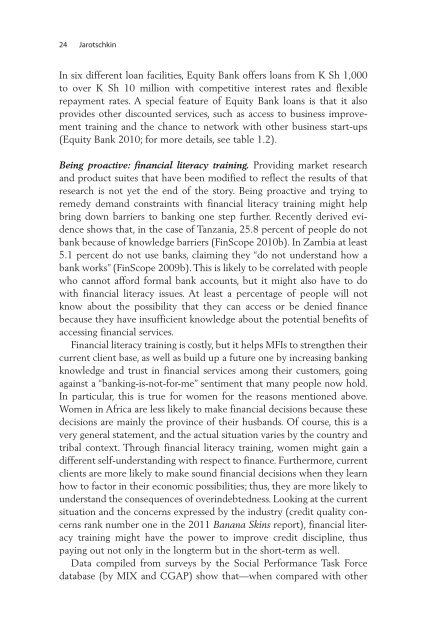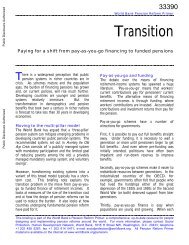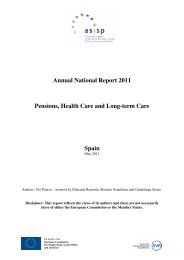Financial Sector Development in Africa: Opportunities ... - World Bank
Financial Sector Development in Africa: Opportunities ... - World Bank
Financial Sector Development in Africa: Opportunities ... - World Bank
You also want an ePaper? Increase the reach of your titles
YUMPU automatically turns print PDFs into web optimized ePapers that Google loves.
24 Jarotschk<strong>in</strong><br />
In six different loan facilities, Equity <strong>Bank</strong> offers loans from K Sh 1,000<br />
to over K Sh 10 million with competitive <strong>in</strong>terest rates and flexible<br />
repayment rates. A special feature of Equity <strong>Bank</strong> loans is that it also<br />
provides other discounted services, such as access to bus<strong>in</strong>ess improvement<br />
tra<strong>in</strong><strong>in</strong>g and the chance to network with other bus<strong>in</strong>ess start-ups<br />
(Equity <strong>Bank</strong> 2010; for more details, see table 1.2).<br />
Be<strong>in</strong>g proactive: f<strong>in</strong>ancial literacy tra<strong>in</strong><strong>in</strong>g. Provid<strong>in</strong>g market research<br />
and product suites that have been modified to reflect the results of that<br />
research is not yet the end of the story. Be<strong>in</strong>g proactive and try<strong>in</strong>g to<br />
remedy demand constra<strong>in</strong>ts with f<strong>in</strong>ancial literacy tra<strong>in</strong><strong>in</strong>g might help<br />
br<strong>in</strong>g down barriers to bank<strong>in</strong>g one step further. Recently derived evidence<br />
shows that, <strong>in</strong> the case of Tanzania, 25.8 percent of people do not<br />
bank because of knowledge barriers (F<strong>in</strong>Scope 2010b). In Zambia at least<br />
5.1 percent do not use banks, claim<strong>in</strong>g they “do not understand how a<br />
bank works” (F<strong>in</strong>Scope 2009b). This is likely to be correlated with people<br />
who cannot afford formal bank accounts, but it might also have to do<br />
with f<strong>in</strong>ancial literacy issues. At least a percentage of people will not<br />
know about the possibility that they can access or be denied f<strong>in</strong>ance<br />
because they have <strong>in</strong>sufficient knowledge about the potential benefits of<br />
access<strong>in</strong>g f<strong>in</strong>ancial services.<br />
<strong>F<strong>in</strong>ancial</strong> literacy tra<strong>in</strong><strong>in</strong>g is costly, but it helps MFIs to strengthen their<br />
current client base, as well as build up a future one by <strong>in</strong>creas<strong>in</strong>g bank<strong>in</strong>g<br />
knowledge and trust <strong>in</strong> f<strong>in</strong>ancial services among their customers, go<strong>in</strong>g<br />
aga<strong>in</strong>st a “bank<strong>in</strong>g-is-not-for-me” sentiment that many people now hold.<br />
In particular, this is true for women for the reasons mentioned above.<br />
Women <strong>in</strong> <strong>Africa</strong> are less likely to make f<strong>in</strong>ancial decisions because these<br />
decisions are ma<strong>in</strong>ly the prov<strong>in</strong>ce of their husbands. Of course, this is a<br />
very general statement, and the actual situation varies by the country and<br />
tribal context. Through f<strong>in</strong>ancial literacy tra<strong>in</strong><strong>in</strong>g, women might ga<strong>in</strong> a<br />
different self-understand<strong>in</strong>g with respect to f<strong>in</strong>ance. Furthermore, current<br />
clients are more likely to make sound f<strong>in</strong>ancial decisions when they learn<br />
how to factor <strong>in</strong> their economic possibilities; thus, they are more likely to<br />
understand the consequences of over<strong>in</strong>debtedness. Look<strong>in</strong>g at the current<br />
situation and the concerns expressed by the <strong>in</strong>dustry (credit quality concerns<br />
rank number one <strong>in</strong> the 2011 Banana Sk<strong>in</strong>s report), f<strong>in</strong>ancial literacy<br />
tra<strong>in</strong><strong>in</strong>g might have the power to improve credit discipl<strong>in</strong>e, thus<br />
pay<strong>in</strong>g out not only <strong>in</strong> the longterm but <strong>in</strong> the short-term as well.<br />
Data compiled from surveys by the Social Performance Task Force<br />
database (by MIX and CGAP) show that—when compared with other







